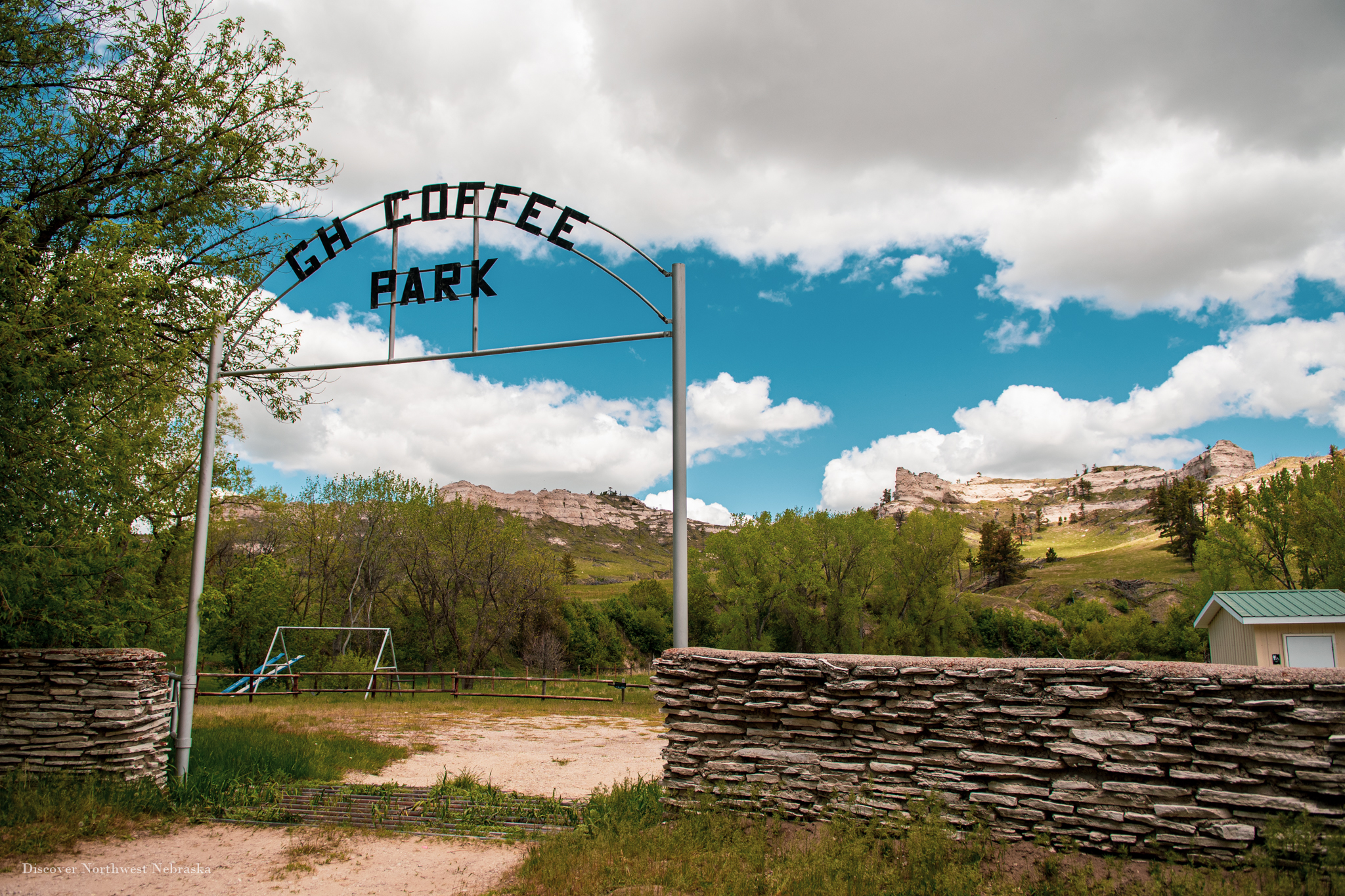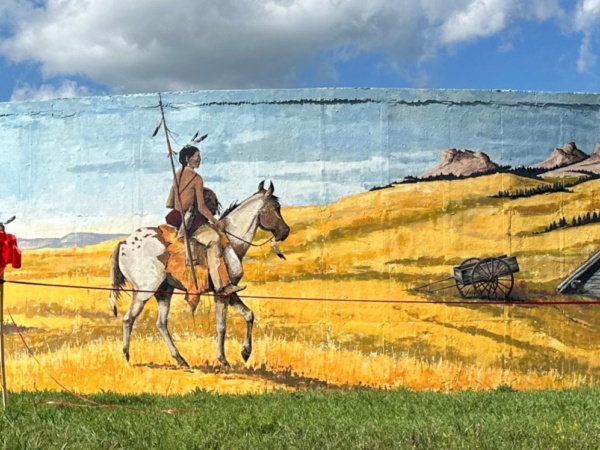By Kerri Rempp
Discover Northwest Nebraska
Nestled below Pants Butte and Castle Rock in Sioux County lies Sowbelly Canyon, offering a secluded, enchanting experience whether you’re looking for a scenic drive, birdwatching or first-class trout fishing.
Often referred to as a “Pine Ridge paradise,” the 11-mile Sowbelly Canyon, surrounded by buttes, pine trees, abundant wildlife and bisected by Sowbelly Creek, cuts through mostly private property. While a drive through the canyon provides a unique experience on its own, a stop at Coffee Park halfway through the canyon gives visitors more time to enjoy nature. Owned by the Village of Harrison, the 160-acre Coffee Park affords access to Sowbelly Creek.
Cast a Line
The creek is one of the few cold-water streams for trout fishing in the state, and this summer has been rehabilitated by the Nebraska Game and Parks. Game and Parks District Fisheries Manager Al Hanson said the habitat work included rehab of pools and riffles for better trout feeding and erosion prevention. The efforts also include an angler-friendly fence crossing and improvements to aid the Village of Harrison in maintenance of the park.
Sowbelly Creek is home to both brown and brook trout.
“The improvements will allow the creek to carry more and larger fish,” Hanson said.
The creek and canyon were impacted by a flood in 2015 when four to six inches of rain carried fire-downed trees down the hillsides. A logjam estimated between 2,000-4,000 cubic yards of wood resulted and had to be removed in the months following the flood. A Game and Parks press release at the time noted that the flood, even with its negative impacts, also had positive results. Game and Parks District Wildlife Manager Matt Steffl said in the release that the flood aided the stream’s health as it washed silt and soot away and deepened pools.
“We don’t have a lot of miles of public cold-water trout streams in Nebraska, so we like to do what we can to take care of what we have,” Steffl said at the time. “When the work is done here, we expect it to be even more of an attraction. When that flood went through, it washed out a lot of ash from the ’06 wildfires and also cut some holes here and there. In most places, it made a lot better cold-water stream than what we had before.”
The work completed this summer is a continuation of the rehabilitation from the flood’s aftermath and also included the addition of a culvert, the removal of dead trees from the park and the enhancement of overhead cover, Hanson said.
According to a 2015 Game and Parks blog by Daryl Bauer, less than 5% of the 12,000 miles of rivers and streams in the state can support trout.

Remember History
While trout fishing in Sowbelly Creek is a popular reason to explore the canyon, it’s far from the only motivation. The drive through the canyon is scenic and easily allows visitors to imagine an earlier era.
According to legend, the canyon was named Sowbelly after a confrontation between a band of Cheyenne led by Chief Running Deer and soldiers from nearby Fort Robinson. The story goes that Running Deer and his group were wintering in the canyon when soldiers learned of their presence and rode out to bring them to the Fort and eventually the reservation. The Cheyenne allegedly heard the soldiers coming and spread out through the canyon to ambush them. The surviving troops found themselves boxed in and trapped for several days with only pork belly to eat.
Harrison resident Jane Lewis’ poem, available at the Sioux County Historical Museum, imagines the scenario.
G.H. Coffee Park was dedicated by the Village of Harrison in 1976 as a Bicentennial project to honor the county’s pioneers. According to “Sioux County: Memoirs of Its Pioneers,” the 160 acres of land was homestead in 1887 by George Walker, a pioneer Sioux County attorney. It changed hands several times between then and 1931, when it was purchased by Howard Thompson. Shortly after, it appears a group of men, including T.M. Powell, A.M. Brown, Max Federle, John T. Coffee, Harvey Bixler, John Mann, Rex Coffee and G.H. Coffee, purchased the land but left the title in Thompson’s name. The group attempted to donate the land to the Village of Harrison for use as a recreation area, but the village refused it.
G.H. Coffee eventually purchased the land outright in 1948, and it was successfully donated to the village in 1972. An anonymous gift and other matching funds were used to secure a grant from the Game and Park’s Land and Water Conservation Fund in 1975 to develop a portion of the land for day use, according to the Sioux County history book. The late Virginia Coffee headed the Sioux County Bicentennial Celebration Committee and helped Harrison and Sioux County develop both Coffee Park and the Sioux County Historical Museum. Her obituary noted that the village and county were the first in the state to meet the guidelines to establish Bicentennial projects.
Between February 1975 and June 1976, picnic tables, fire grates, a water well, restrooms, parking, fencing, shelters and a gate were added to Coffee Park. The Harrison VFW donated and installed a flag pole. More than 400 people attended the dedication ceremony June 27, 1976, including Congresswoman Virginia Smith, who delivered a speech and presented a flag flown over the Capitol Building.
Since its inception, Coffee Park has offered day travelers a quiet respite to picnic, fish and watch for wildlife. It’s also a popular spot for weddings, family reunions, church services and other gatherings.

Enjoy Birdwatching
Sowbelly Canyon and Coffee Park are also popular spots for birdwatching as it is along the eastern edge of the range for species associated with the Rocky Mountains.
Western species often seen in the area include the Common Poorwill, White-throated Swift, Lewis’s Woodpecker, Cordilleran Flycatcher, Pinyon Jay, Violet-green Swallow, Pygmy Nuthatch, Western tanager and more. Some eastern deciduous forest species, such as the Rose-breasted grosbeak, can also be sighted in Sowbelly Canyon, according to the Nebraska Birding Guide.
Roadside birding in the canyon or on-foot viewing in Coffee Park is possible.
The canyon is listed as a birding hot spot on Audubon.org and eBird.org, with the latter listing 169 species submitted to its online tracking system (https://ebird.org/barchart?byr=1900&eyr=2022&bmo=1&emo=12&r=L281255). The site also offers a printable field checklist for Sowbelly Canyon birdwatchers at https://ebird.org/printableList?regionCode=L281255&yr=all&m=.
How to Get There
Sowbelly Canyon can be accessed from either end.
- Travel north of Harrison on Monroe Canyon Road just under one mile, turn right on to Sowbelly Road.
- Travel 3.8 miles east of Harrison on Highway 20, turn left on to Pants Butte Road and travel for 10 miles. Turn left on Sowbelly Road.
- Travel roughly 23 miles west of Crawford on Highway 20, turn right on to Pants Butte Road and travel for 10 miles. Turn left on Sowbelly Road.
Sowbelly Road is minimum maintenance and receives no snow removal. Road closed signs go up in the fall and stay well into the spring until the last snowdrifts melt, which tends to be far later than on the surrounding plains. Plan accordingly.





Vicki Kotschwar
Wonderful article Kerri. We’ve lived this close for a long time and never driven through the area. That will change as we plan to do just that this Fall. Thanks much for a very interesting and enjoyable article.